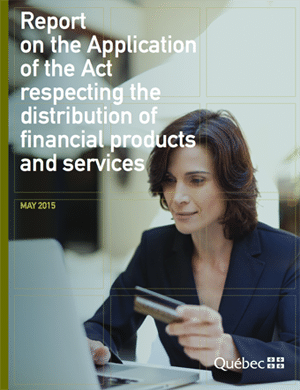On Friday, the Quebec Ministry of Finance published a document that the industry had been awaiting for 15 years: the Report on the Application of the Act respecting the distribution of financial products and services. This 46-page report contains five recommendations. Most notably, it questions the existence of the Chambre de la sécurité financière and the Chambre de l’assurance de dommages.

“The ARDFPS has responded well to the industry’s and the public’s needs. In particular, it has helped to sustain consumer confidence in the industry despite the fraud cases that have occurred over the past decade. The industry is efficient and competitive. On the other hand, the current system is beginning to show signs of losing impetus and no longer adequately satisfies the needs engendered principally by the new technologies. If nothing is done, the regulatory framework risks becoming inadequate and outmoded. Both the industry and the public could suffer as a result. The time has, therefore, come to review it,” chapter 1 of the report summarizes.
The first recommendation is to draw on the recommendations of the Canadian Council of Insurance Regulators (CCIR) to put in place a flexible legal framework that will enable insurers to offer their products online.
“It is in the insurers’ interests to properly select the products that they offer online to ensure that they are adapted to this distribution channel. They would have to assume the cost of a poorly adapted distribution method. Furthermore, the representative’s advice would always be indicated for certain products and for consumers who prefer to rely on a professional. Insurers should be in a position to determine the method of distribution best suited to the different products that they offer. The regulations must, therefore, grant them sufficient flexibility.”
The second proposal is to establish a legislative framework for distribution without a representative that applies directly to insurers, which must ensure that the mandataries (now called distributors) abide by the rules.
“This measure would make the insurer aware of its responsibilities and would make it possible to apply the regulations to the insurer instead of the distributor. Against this background, it would undoubtedly be possible to review overall oversight of distribution without a representative. The rules might resemble those governing online distribution. Accordingly, regardless of the method of distribution, consumers would have access to the same tools to make enlightened decisions,” the report explains.
The third recommendation is to examine all approaches to ease the regulatory and financial burden of registrants, while maintaining adequate oversight of the distribution of financial products and services.
The Ministry questions the value of the twofold oversight structure made up of the Autorité des marchés financiers (Quebec’s financial markets regulator) and two chambers: the Chambre de la sécurité financière and the Chambre de l’assurance de dommages (SRO’s for life insurance advisors and general insurance brokers).
The fourth recommendation provides for consumers to be compensated when they are the victims of a fraud perpetrated by a certified representative even if the claim concerns the sale of products that the representative was not authorized to offer. Lastly, the report recommends integrating industry representatives in the decision-making process of the Fonds d’indemnisation des services financiers (financial services indemnity fund).
The Ministry thus plans to review management of the compensation fund. However, the Minister wants to retain the one-stop model in place, but would like the industry to be more involved in managing the fund. One way to do this would be to form a compensation committee made up of three members appointed by the Minister. This committee would be obliged to report to the Ministry on its activities annually, the report recommends.






